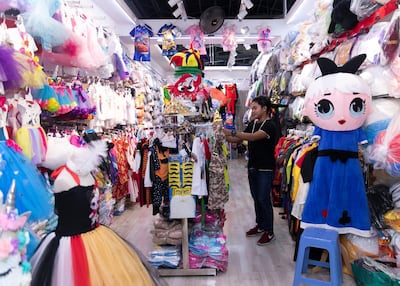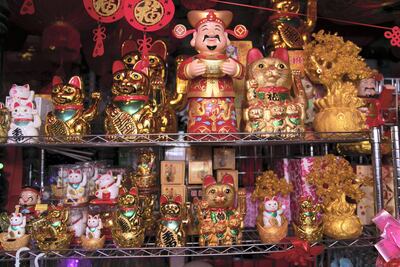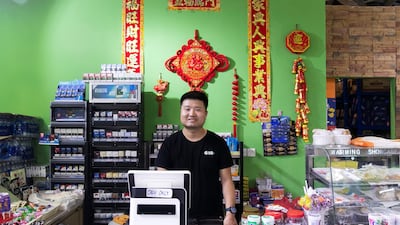When Fan Wenjun boarded an almost empty plane to Dubai on Valentine’s Day in 2005, he did not take it as a good sign.
Dubai was still an unusual destination for Chinese tourists and entrepreneurs. Passengers on the Emirates flight from Shanghai were few and they stretched themselves out on the empty seats to sleep.
“It was a big plane and there were only maybe 100 passengers,” said Mr Fan, who was then 23. “So I was thinking, what of this city? At that time I didn’t have information about Dubai and it was expensive to go online and search. A lot of people told me the Middle East was unsafe.”
Instead, he found a city not unlike his native Shanghai, met his wife and became an entrepreneur.
Mr Fan is one of more than 200,000 Chinese residents who call the Emirates home. With increasing trade between China and the UAE, their numbers are set to grow.
This week, Sheikh Mohamed bin Zayed, Crown Prince of Abu Dhabi and Deputy Supreme Commander of the Armed Forces, arrived in Beijing for a three-day tour of China and talks with President Xi Jinping.
China is one of the UAE’s largest trading partners.
There are about 6,000 Chinese companies operating in the Emirates and entrepreneurs such as Mr Fan have helped forge closer relations.
His story is typical. After working for the Chinese government in Dubai, he started a textile-trading business in Deira. When trade restrictions between Dubai and Iran tightened and the economy slowed, he closed the Deira company and opened a grocery, Panda Panda Supermarket, in Dragon Mart on the outskirts of Dubai.
It was the world’s largest Chinese trading hub outside mainland China and brought thousands of Chinese traders to Dubai when it opened in 2004. They formed a Chinese community at the nearby International City residential development, opening Chinese restaurants and groceries with Mandarin signboards.
After success in Dubai, many moved on to other Gulf states.
Mr Fan stayed in the city where he met his wife. Almost everything they want is there, except family.
Ms Fan has temporarily returned to her home city of Jiujiang, where her mother lives, for her second pregnancy.
Mr Fan awaits her return. If he had to do it all over, he would still chose Dubai.
“I don’t think I would have met my wife anywhere else. China is so big.”
Chen Xiaoyu came to Dubai about a decade after Mr Fan.
She was 21, newly out of university, and expected luxury. By 2016, Dubai was known as a city of wealth.

“Before coming I didn’t know too much what Dubai looked like,” said Ms Chen, who is now 24.
“I just knew it’s rich and famous.”
She arrived with friends who had registered with a recruiter at their university in Changsha city.
“We all wanted a new chance to go to another country,” she said. “At that time I had lived 21 years in one city. I was really bored in the same place for 21 years.”
Ms Chen landed work as a manager at a curtain company in Dragon Mart.
It had already transformed from a wholesale centre into a typical UAE shopping mall: alongside Chinese machinery were Syrian furniture shops, carts of Lebanese sweets and olive oil, racks of Palestinian thobes and abaya shops staffed by Bangladeshi and Filipino clerks. A cinema and Carrefour were added.
When Ms Chen’s two-year visa expired, she renewed. Her best friend left within months.
“She was working in Dragon Mart and it was boring,” said Ms Chen. In her spare time, Ms Chen goes to the spa, shops, cooks with roommates, or reads and paints at their villa in International City.
This was inconceivable for women 30 years ago, said Lulu Hong, a teacher who moved to the UAE in 1992.
She came with her husband, a Chinese government employee. She estimates Chinese expatriates then numbered about 1,000 and it was particularly difficult for Chinese women under the age of 30 to secure a UAE visa.

Private sector work for any Chinese nationals could be hard to come by. “I wanted to work but no company would hire Chinese in either shops or offices,” said Ms Hong, who is 51 and originally from Harbin.
“Now, everywhere you go, you can see Chinese staff in companies, in shopping malls, in every field.”
As the UAE courts Chinese filmmakers, railway builders, agricultural chemists and entrepreneurs, Chinese expatriates are set to leave their mark on the Emirates.

